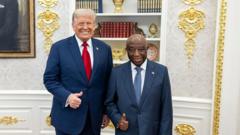President Trump praised Liberian President Joseph Boakai for his English, sparking a discussion about Liberia's historical connections to the US. Here are six important facts about the country, from its origins as a settlement for freed slaves to its unique cultural and national identity.
Understanding Liberia: Key Facts After Trump's Praise for its President's English

Understanding Liberia: Key Facts After Trump's Praise for its President's English
A closer look at Liberia's rich history and unique ties to the United States following President Trump's comments on the country's leader's English skills.
US President Donald Trump recently commended Liberia's President Joseph Boakai for his "good English," inadvertently reigniting conversations about Liberia's deep-rooted ties to the United States. The country, primarily English-speaking, holds a significant place in American history as it was founded in 1822 by freed African-American slaves and declared its independence in 1847. Below are six vital aspects of Liberia's connection to the US and its cultural identity that might have eluded the President.
1. **History of Freed Slaves**
Liberia was established as a haven for freed African-American slaves. Former US President Abraham Lincoln acknowledged Liberia's independence, allowing its heritage to remain closely linked with American culture, evident in its leadership—ten of its presidents have been born in the US.
2. **Capital Named After a US President**
Monrovia, the capital, honors James Monroe, who was instrumental in the American Colonization Society's founding. The influence of American architecture is apparent in the city, which features streets named for US historical figures and establishments like the John F. Kennedy Medical Center.
3. **Flags with Similar Symbols**
The symbolism in Liberia's flag closely echoes that of the US flag, consisting of red and white stripes with a blue box containing a single star. This design commemorates Liberia as Africa's first independent republic.
4. **Athletic Legacy**
Timothy Weah, son of former President George Weah, represents both Liberia and the US in professional football. With his lineage linked to the world's sports stage, he highlights the cultural blend between the nations.
5. **Nobel Peace Laureate**
Ellen Johnson Sirleaf, Liberia's first elected female leader, also carries an American academic background. She received the Nobel Peace Prize for her commitment to maintaining peace, pointing to Liberia's strides toward global recognition since the end of its civil war.
6. **Economic Impact of Rubber Trade**
The Firestone rubber plantation, established in 1926, continues to be Liberia's largest private employer despite facing criticism over workers' rights. This industry is a significant part of Liberia’s economy, with the US as its primary market.
In light of Trump's comments, Liberia's Foreign Minister noted that while the US president's remark stemmed from a lack of global understanding about African linguistic diversity, the dialogue also illuminated the unique historical narratives shared by Liberia and the United States. Reactions from Liberians echoed these sentiments, ranging from pride to concern over potential misconceptions.
In conclusion, Liberia is a nation marked by its intricate history and close ties with the US, reflecting a diverse and rich identity that continues to evolve today.


















